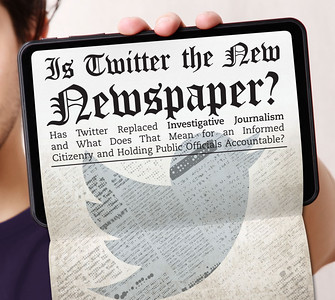WSU Panel to Discuss Effects of Twitter on Journalism
 OGDEN, Utah — In the world of instant gratification, a journalist’s deadline is always five minutes ago. A panel of journalists will debate the evolution and adaptation of news in the digital age and the impact on investigative journalism and an informed citizenry at Weber State University April 15 from 12:30-2 p.m. in the Shepherd Union Ballrooms. The event, including lunch, is free and open to the public.
OGDEN, Utah — In the world of instant gratification, a journalist’s deadline is always five minutes ago. A panel of journalists will debate the evolution and adaptation of news in the digital age and the impact on investigative journalism and an informed citizenry at Weber State University April 15 from 12:30-2 p.m. in the Shepherd Union Ballrooms. The event, including lunch, is free and open to the public.The panel discussion, “Is Twitter the New Newspaper?,” is part of the annual Haven J. Barlow Spring Civic Leadership Forum and is hosted by WSU’s Olene S. Walker Institute of Politics & Public Service. Lunch will be provided at 12:30 p.m. for those who RSVP for the event. The panel discussion will begin at 1 p.m.
“The rapid changes introduced by the Internet and mobile devices have revolutionized the way in which Americans consume their news,” said Carol McNamara, Walker Institute director. “Traditional outlets for the news — newspapers and television news — have seen their readership and viewership reduced as the number of people who get their news online increases.”
Local journalists have been invited to debate whether Twitter has replaced investigative journalism and what that means for an informed citizenry. The panel also will discuss whether news organizations can still devote resources to investigative reporting to ensure they hold public officials and political leaders accountable.
“The investigative power and determination of the press to hold public officials accountable for their actions is essential to the health and civic vibrancy of a democratic republic,” McNamara said.
Panelists include Debbie Dujanovic, KSL News; Robert Gehrke, Salt Lake Tribune; Lisa Riley Roche, Deseret News; Ben Winslow, Fox 13 News; and Jean Norman, faculty advisor of WSU’s student newspaper, The Signpost.
Questions for discussion will include:
- Is Twitter being used to inform the public, or does it lead to mere entertainment and shock-value journalism?
- Does the plethora of online and cable news outlets cause viewers to base their news selection on political partisanship?
- Can the media still hold the public’s attention for a long investigative piece, or has online news encouraged cursory reading?
- Is the ability of the media to pursue in-depth investigative journalism necessary for voter education and participation? Does its demise impede informed voters and a vibrant democracy?
For more information on the Walker Institute, visit weber.edu/walkerinstitute.
Visit weber.edu/wsutoday for more news about Weber State University.
- Marcus Jensen, Office of Marketing & Communications
801-626-7295 • marcusjensen@weber.edu - Contact:
- Carol McNamara, Walker Institute director
801-626-6206 • carolmcnamara@weber.edu
